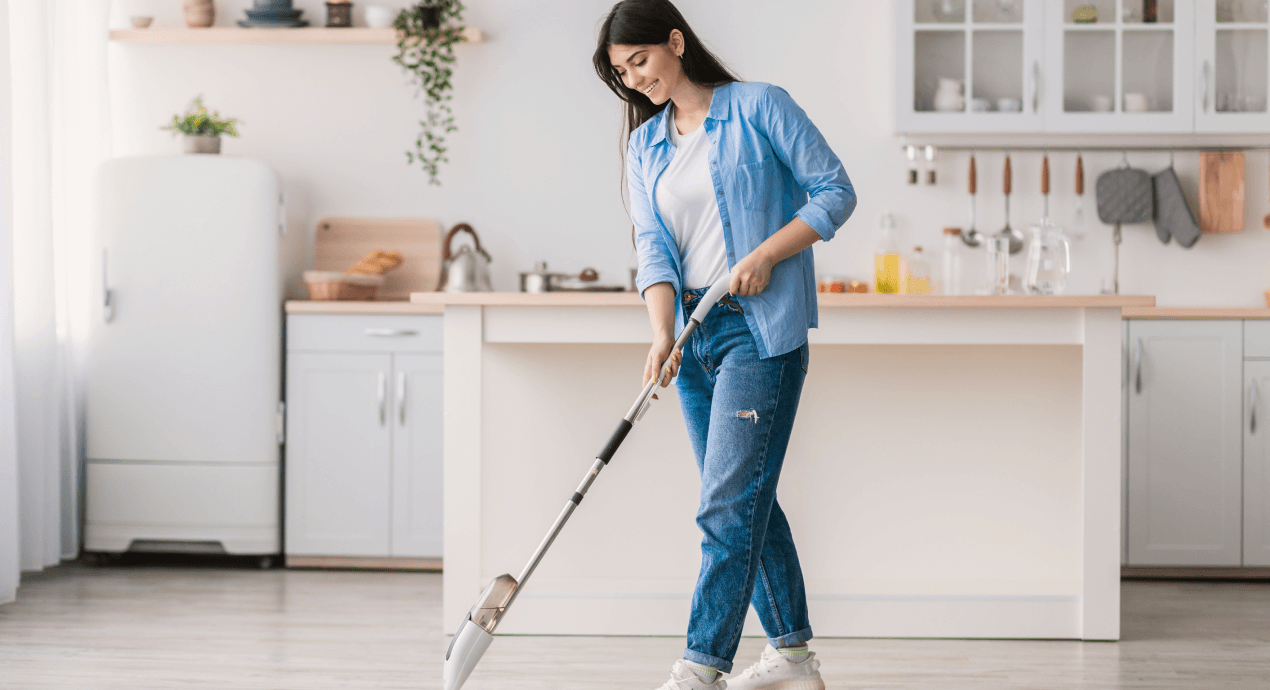
Contemplating coverage?
Subscribe to receive our emails & get
$200 OFF!
Have questions?
Call us: (833) 544-8273


Written By Ally Sabatina
Your home’s floors see a lot of mess. Whether it’s sticky kid hands, pet mess, or everyday grime from coming and going, keeping them clean can feel like a full-time job. Natural floor cleaners can enable you to complete this task without introducing potentially harmful chemicals to your home. They can even be a trick in a pinch if you haven’t had time to pick up more since your last drop of store-bought floor cleaner.
Natural floor cleaners are simple, but impactful solutions that allow you to maintain your home without compromising your family’s health. Many floor cleaning chemicals are toxic, and it can be hard to decipher exactly what’s in them, especially without a chemistry degree.
Incorporating homemade floor cleaners into your routine can give you peace of mind that you’re not exposing yourself or your loved ones to anything needlessly harmful. Bonus: you probably have a lot of the ingredients already, reducing unwanted clutter.
Making your household’s floor cleaner has many advantages, including the following:
Though the benefits outweigh the drawbacks, we’d be remiss not to mention a few disadvantages of homemade cleaning solutions. DIY natural cleaners aren’t as finely honed for different floor types as commercial cleaning products, and they’re more labor-intensive because you have to mix the ingredients yourself.
Before you can make natural floor cleaners, make sure you have the following ingredients:
Other ingredients that may be helpful for extra cleaning power:
Making your own natural floor cleaner is simple and effective. However, always exercise caution when making DIY floor cleaners. Avoid mixing bleach with ammonia, and be careful not to leave standing water, which can lead to water damage.
Combine 1 cup vinegar with 1 cup baking soda and enough water to fully dissolve the baking soda. We recommend warm water for additional cleaning power. Mix in a bucket and mop or transfer to your favorite floor cleaning appliance.
Using the same base recipe above, you can add a couple of drops of fresh lemon juice or essential oils for a nice, clean scent. A drop or two of olive oil can polish wood floors. Rubbing alcohol can reduce streaks, and Borax can improve your solution’s cleaning power for extra tough messes and stains. You can add about a tablespoon of each to a gallon of water.
Sometimes, soap and water are all you need. If you don’t know the material of your floors or you don’t want to deal with the hassle of figuring out what you can and cannot use on your specific floor type, soap and water can be a gentle, but effective homemade floor cleaner. Add a ¼ cup of dish soap to a gallon or more warm water and mix until sudsy. Mop as usual and dry carefully if you have hardwood floors.
Natural floor cleaners are a great tool, but like any tool, they can only do so much. If you have old, set-in stains, a historical home, a long list of allergies, heated floors, or you’re in any way shy about cleaning your floor yourself, a professional touch may be warranted.
Professional carpet cleaners, hardwood refinishers, and even thorough house cleaners can access commercial cleaning chemicals that target deeper odors, stains, messes, and more.
Enrolling in a Liberty Home Guard home warranty gives you access to more than home systems and appliance coverage. Our add-ons are designed to be competitive, and it’s no secret that we offer more than our competitors. You can easily add carpet cleaning or central vacuum coverage. The carpet cleaning add-on entitles you to up to 2 professional cleanings per year, reducing your out-of-pocket costs and home maintenance tasks.
Call (833) 543-7830 or request a free online quote anytime for more information.
Distilled white vinegar combined with a couple of drops of dish detergent is the best natural floor cleaner for hardwood floors. To make it, dilute ½ cup of vinegar in a gallon of water, then add your favorite dish soap for scent and extra cleaning power.
Yes, you can use vinegar as a natural floor cleaner, but exercise caution. Always dilute the vinegar before using it, and thoroughly dry the area after cleaning to avoid damage.
You can clean your floors with a natural cleaner as often as your routine allows. To stay on top of regular maintenance, we recommend sweeping and mopping your floors at least once per week. Oil-finished hardwood should be cleaned less often to avoid stripping the surface.
You can clean your floors with a natural cleaner as often as your routine allows. To stay on top of regular maintenance, we recommend sweeping and mopping your floors at least once per week. Oil-finished hardwood should be cleaned less often to avoid stripping the surface.
Stay Ahead of Potential
Home Mishaps!
Subscribe to our Liberty Home Guard Newsletter and gain access to exclusive content that ensures your peace of mind.